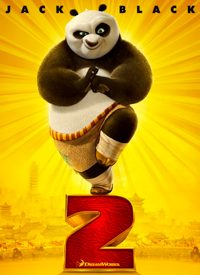
Viewers encounter the same chatty panda from the first film, whose appetite and hunger for life are just as insatiable as before. This episode reveals a more curious Po, however, who's anxious to learn about his past and the identity of his real parents. Po’s quest for the truth unfortunately alienates Po from his adopted father, Mr. Ping.
While Po is dealing with his own personal crisis, he learns that a deranged peacock, Lord Shen, seeks to destroy Kung Fu with the introduction of gunfire, and enslave all of China.
At the beginning of the film, moviegoers learn that Lord Shen’s family invented fireworks long ago, but Lord Shen intended to use the gunpowder for evil means. As the film progresses, Lord Shen seeks to steal metal from all the local villages in order to build an array of cannons and bullets and take over China. Aware that Lord Shen has garnered enough ammunition to begin his conquest, Po and the Furious Five — Tigress, Crane, Mantis, Viper, and Monkey — set out to stop him in his tracks.
Can Po and his friends prevent the destruction of their beloved homeland and secure the longevity of Kung Fu. And can Po do so while conquering his own inner turmoil that has managed to strain his relationship with his adopted father and caused him to question his own identity and his ability to achieve his inner peace?
As it is a film geared for younger audiences, the resolution should be fairly predictable.
Unfortunately, despite the seemingly exciting plot of Kung Fu Panda 2, the film falls short of entertainment value. Dark and often slow-moving, the film lacks the energy it requires to carry audience attention and somehow gives the impression that the film is in fact longer than it is. A quick glance around the theater revealed moviegoers shifting in their seats and children resting their heads on the armrest — not exactly every director’s dream.
While the film is at times humorous on a number of levels, it mostly employs the kind of slapstick humor that appeals to younger audiences. Unfortunately, the film’s plot is a bit too complicated for that same younger audience, as much of it is focused on Po’s and Lord Shen’s quest for self-identity. The film embraces the sort of depth that may enthrall older audiences, but would otherwise be wasted on the younger crowds.
Likewise, Christian parents may be a bit concerned with the film’s reliance on Taoism and pagan beliefs. For example, there is a heavy emphasis on finding one’s “inner peace” and using that peace to accomplish seemingly impossible tasks. It also references finding harmony in the universe and includes pagan ideas involving a soothsayer that can predict one’s future. Naturally, for those who believe that inner peace and harmony can only be achieved by a close relationship with Christ, this element of the film may be a bit disconcerting.
Despite the presence of these non-Christian elements, Kung Fu Panda 2 also includes redemptive themes such as forgiveness and delivers healthy messages such as the need to let go of the past in order to secure one’s own happiness. The film proves that anger can be a powerfully debilitating element. It also includes universal themes of loyalty, friendship, courage, and sacrifice.
Overall, Kung Fu Panda 2 is the type of film whose sporadic moments of entertainment might make it a better choice for a DVD rental rather than an expensive excursion to the theaters, particularly since the film’s appropriate audience is questionable.




